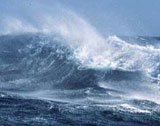 The world's oceans are slowly getting more acidic, say scientists. The world's oceans are slowly getting more acidic, say scientists.
The researchers from California say the change is taking place in response to higher levels of carbon dioxide in the atmosphere. The lowering of the waters' pH value is not great at the moment but could pose a serious threat to current marine life if it continues, they warn. Ken Caldeira and Michael Wickett, from the Lawrence Livermore National Laboratory, report their concerns in the journal Nature. Increasing use of fossil fuels means more carbon dioxide is going into the air, and most of it will eventually be absorbed by seawater. Once in the water, it reacts to form carbonic acid. Scientists believe that the oceans have already become slightly more acidic over the last century. But these researchers have tried to predict what will happen in the future by combining what we know about the history of the oceans with computer models of climate change. "This level of acidity will get much more extreme in the future if we continue releasing CO2 into the atmosphere," said Dr Caldeira. "And we predicted amounts of future acidity that exceed anything we saw over the last several hundred million years, apart from perhaps after rare catastrophic events such as asteroid impacts." If carbon dioxide release continues unabated, ocean pH could be reduced by as much as 0.77 units, the authors warn. It is not absolutely clear what that means for marine life, however. Most organisms live near the surface, where the greatest pH change would be expected to occur, but deep-ocean lifeforms may be more sensitive to pH changes. Coral reefs and other organisms whose skeletons or shells contain calcium carbonate may be particularly affected, the team speculate. They could find it much more difficult to build these structures in water with a lower pH. In recent years some people have suggested deliberately storing carbon dioxide from power stations in the deep ocean as a way of curbing global warming. But Dr Caldeira said that such a strategy should now be re-considered. "Previously, most experts had looked at ocean absorption of carbon dioxide as a good thing - because in releasing CO2 into the atmosphere we warm the planet; and when CO2 is absorbed by the ocean, it reduces the amount of greenhouse warming. (Agencies) | 科学家们说世界上的海洋正在慢慢变“酸”。 来自加利福尼亚的研究人员称这种变化是由于大气中二氧化碳含量过高造成的。 他们警告说,目前海水pH值下降还不是非常严重,但是如果继续下降的话会对现存的海洋生物造成严重的威胁。 来自美国罗兰士利弗摩亚国家实验室的肯·卡尔代罗和迈克尔·维克特在《自然》杂志上提出了他们对此事的关注。 越来越多的石油消耗意味着更多的二氧化碳被排放到空气中,而且大部分最终将被海水吸收。二氧化碳一旦进入水中,就会发生反应形成碳酸。 科学家们认为海洋的酸性已经比上个世纪稍微大了一点。 这些研究者们结合所知的海洋历史以及气候变化的电脑模型,试图预测将来的变化。 “如果我们继续向大气中排放二氧化碳的话,将来的酸性浓度会远远超标。”卡尔代罗博士说。 “而且我们估计将来酸的总量会比过去几亿年中人类所见到的任何东西都大,更不用说可能发生类似小行星撞击地球等罕见的大灾难之后了。” 研究者们警告说,如果不减少二氧化碳的排放量,海洋的pH值可能会降低0.77个单位。 尽管这对海洋生命来说意味着什么还不是很清楚。 大多数生物生活在海洋表面,而海洋表面正是pH值预期变化最大的地方,但是深海生物可能对pH值的变化更加敏感。 研究组推测,珊瑚礁和其它骨架或外壳中含有碳酸钙的生物受到的影响可能会格外明显,在pH值较低的水域中它们很难形成这些结构。 最近的几年中,有人蓄意建议将发电站释放的二氧化碳储藏到深海中,以此来抑制全球变暖。 但是卡尔代罗博士说现在应该重新考虑这种策略。 “以前,大多数专家都将海洋吸收二氧化碳看作一件好事——因为将二氧化碳释放到大气中会使大气变暖,然而当二氧化碳被海洋吸收后,温室效应就会降低。” (中国日报网站译) |
